Ways podiatrists say you’re hurting your feet
Your feet are the most used—and abused—body part. Yet while you probably spend a good ten minutes taking care of your face every morning and night, chances are your feet are lucky to get a pedicure once a month. Trust podiatrists when they warn you that should something go wrong with your feet, it could ultimately affect your entire way of life.
For better foot care, we spoke with podiatrists who reveal the most common ways you’re hurting your feet, and tips to protect them.
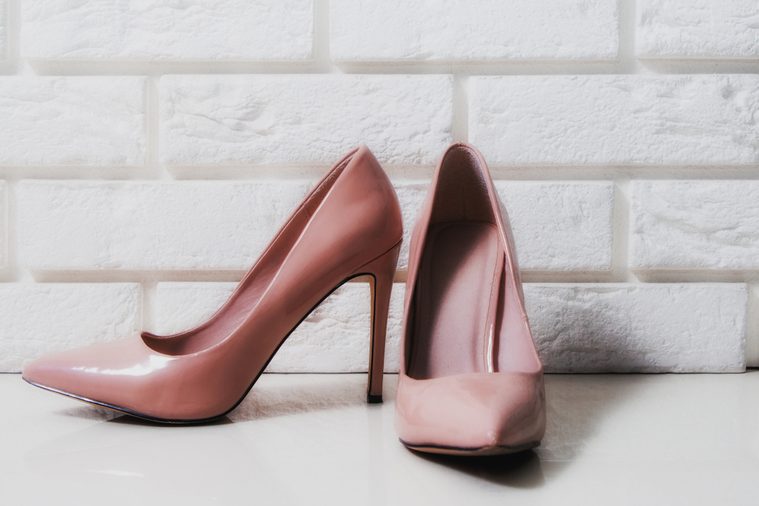
Your heels are too high
Let’s start with the obvious: High heels may make a statement, but if they’re too high, the only statement you’ll be making is “Ouch.” Your feet and legs have to overcompensate to help you walk, which could lead to painful conditions like plantar fasciitis, bunions, and heel spurs, warns Rebecca Pruthi, a podiatric physician and surgeon at Foot Care of Manhattan in New York City. Keep heels to two inches or less to prevent foot pain, Dr. Pruthi recommends.
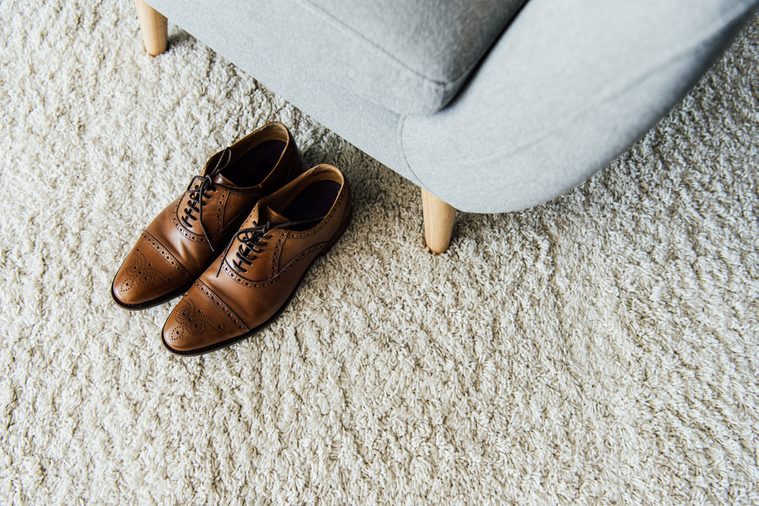
You wear the same shoes every day
It might seem like common sense to find a great, supportive pair of shoes you love—and then wear them nonstop, but this isn’t doing your feet any favors. Jackie Sutera, a foot surgeon, Vionic Lab expert, and spokesperson for the American Podiatric Medical Association, says that slipping on the same shoes day in and day out can cause foot fatigue because you’re constantly using the same areas of the foot for support and walking. Make sure you have a few pairs of comfortable shoes and rotate them throughout the week.
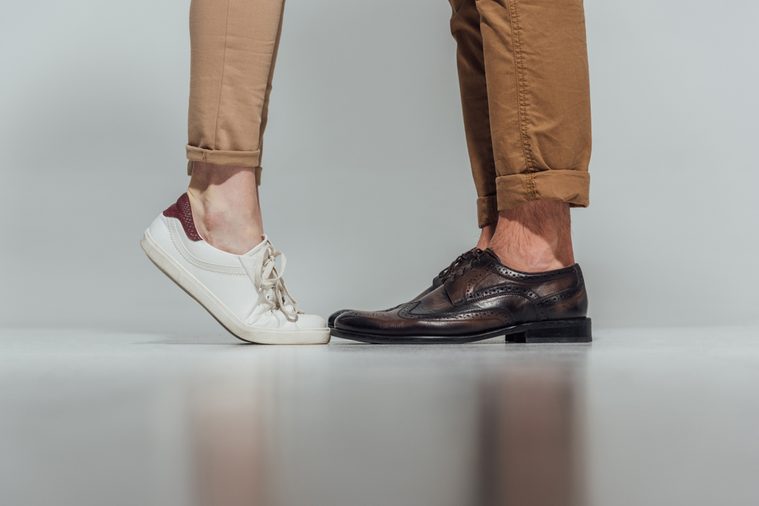
Your shoes are too old
Breaking in shoes may be a drag, but having shoes that are too old will mess up your gait and cause pain, says Dr. Sutera. “When shoes are old and worn out, they will tilt your feet, forcing you to strike the ground in an awkward way,” she says. “Even the slightest angle can hurt your feet and cause back and hip pain.” On average, replace the shoes you wear daily (like your running sneakers) every six months at most, Dr. Pruthi recommends. For other shoes, keep an eye on the soles and replace or resole them once you notice that the support is getting low. Check out the 27 things your podiatrist won’t tell you.
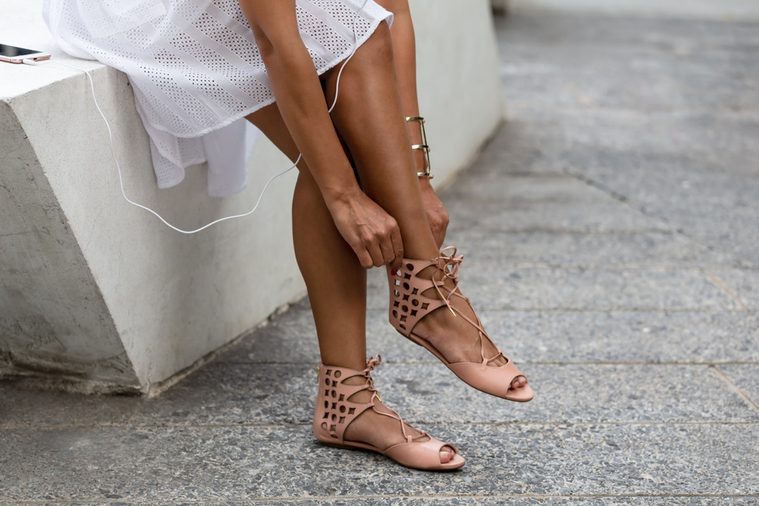
You wear flats to commute
Ballet flats, flat sneakers (like Converses), and flip-flops don’t provide good arch support. If you tend to wear these on your walk to work Monday through Friday, you’re at risk for bunions, hammertoes, and a collapsed arch over time, says Miguel Cunha, a podiatrist and founder of Gotham Footcare in New York City.
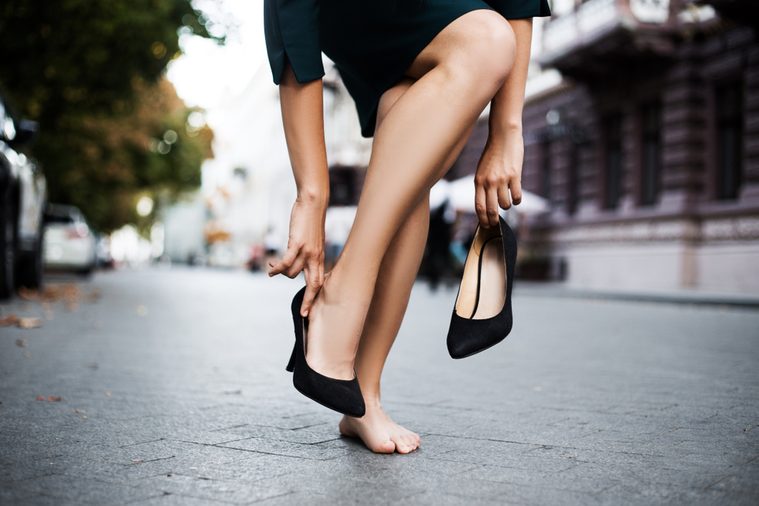
Your toenails are cut funny
“Cutting nails too short or rounded can result in ingrown nails,” says Dr. Pruthi. The nail starts to grow into the skin, which causes discomfort; shoes can often irritate the situation even more by rubbing or squeezing the feet together. Dr. Pruthi says to make sure that nails are cut straight across to avoid the development of any ingrown nails. Read about 7 more shoe mistakes that are killing your feet.
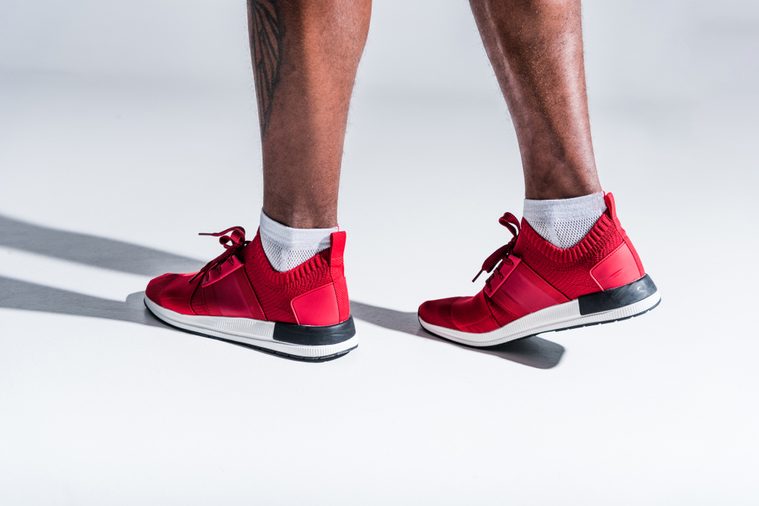
You run in tennis shoes (or play tennis in running shoes)
When it comes to exercising and sports, gym sneakers are not a one-size-fits-all solution. “There is a lot of technology that goes into the design of sneakers,” Dr. Sutera says. “Each activity has specific qualities necessary for the correct shoe. For example, running and walking shoes are made for straight-ahead motion, while basketball and tennis shoes are made for side-to-side movements,” she says.
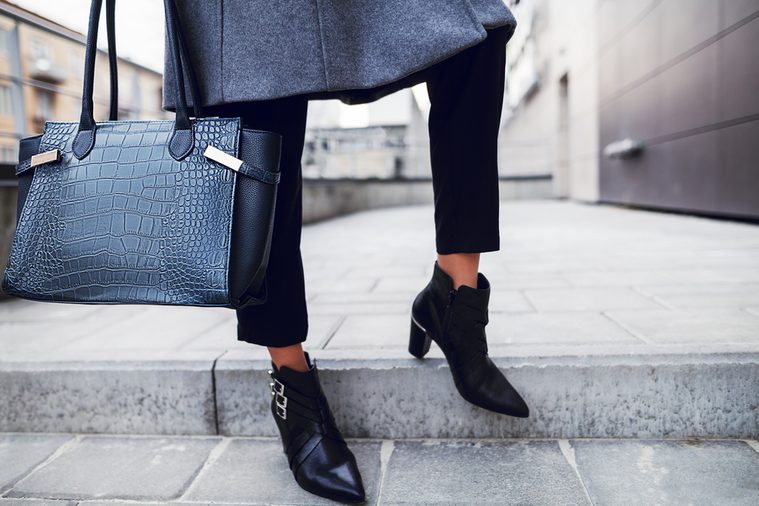
You always carry your bag on the same side
Dr. Pruthi says that if you constantly carry a briefcase or heavy purse on one side, you’re creating a shift in weight that can cause tendinitis, in addition to neck and back pain. Be sure to alternate the side on which you carry things—or use a backpack to distribute weight more evenly.
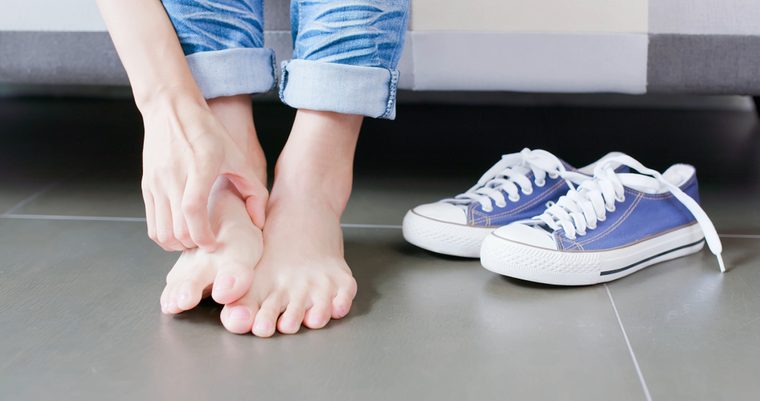
You ignore dry or scaly patches
“Leaving rough, dry skin on the bottom of your feet may eventually lead to skin fissures,” Dr. Pruthi says. “These may worsen over time and could lead to infection.” Dr. Pruthi recommends using a pumice stone in the shower and regularly moisturizing to keep feet healthy. If your feet are scaly, you might have a fungal infection, Dr. Cunha warns. “The best way to get rid of scales is not with lotion but with antifungal cream,” he adds. Check out these 10 signs of disease that your feet can reveal. If you don’t have a fungal infection, homemade foot scrubs are the perfect addition to your self-care routine.
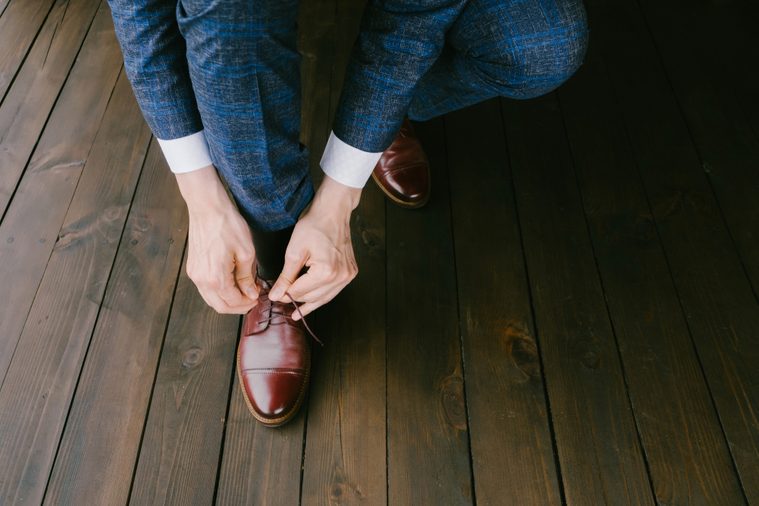
You don’t let your feet breathe at the end of the day
Wearing socks all day can cause your feet to sweat, leading to odor, athlete’s foot, or, in extreme cases, infections, Dr. Pruthi says. Let your feet air out after exercising or when you get home for the day and remember to dry in between your toes after showering, Dr. Pruthi recommends. As for the rule on socks, Dr. Cunha says, change them once a day (more if you’re active) to keep feet fresh. “The general rule of thumb is if you change your underwear, you should change your socks,” he says. Learn about the best essential oils to combat smelly feet.
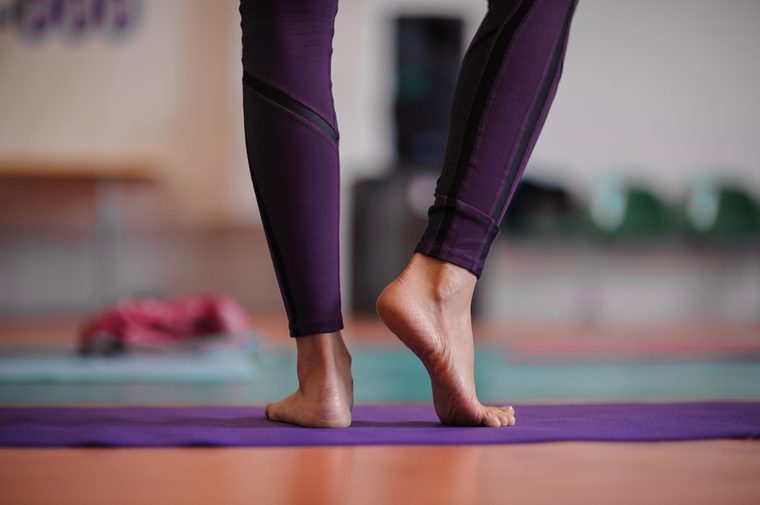
You exercise in bare feet too much
Working out with no shoes sometimes can’t be avoided (hello, yoga and Pilates), but make sure you have enough variety in your routine, Dr. Sutera says. “People who do the same barefoot workout several times a week may experience tendon pain, heel pain, and even joint pain,” she says. Make sure you incorporate a mix of sneaker-wearing workouts and low-impact barefoot exercises. “Our bodies need moderation and variety,” Dr. Sutera says. (Check out these 9 health secrets your feet want to tell you.)
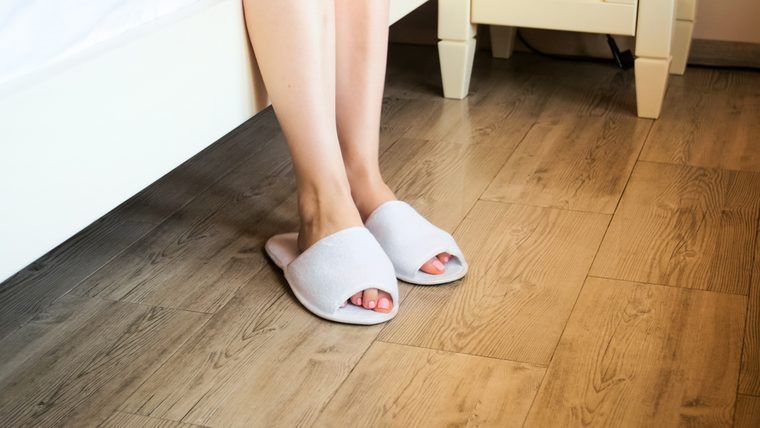
You don’t wear slippers at home
“We underestimate how much time we spend at home with no shoes on,” says Dr. Sutera. “Especially for people who have hardwood floors, marble, or tile, there is nothing between the floor and your feet. Over time, the natural fat pad on the bottom of your feet wears down, leaving you later in life feeling as if your foot is just skin and bones.” Try an orthopedic slipper (Dr. Sutera likes this one) for foot support at home when you’re sans shoes.
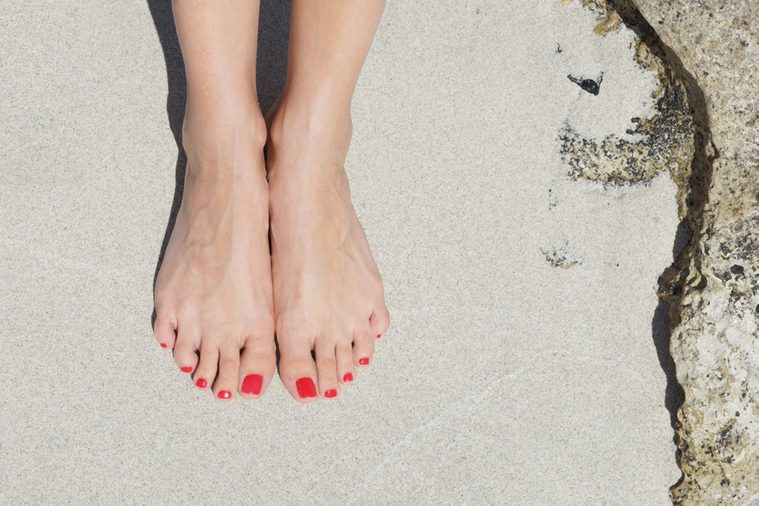
You forget to SPF your feet
If you’re spending all day outside in bare feet, you need to put sunscreen on—no exceptions. “The top and bottom of feet are susceptible to premature aging as well as melanoma,” Dr. Pruthi says. Aside from not wanting skin cancer, trying to wear shoes with sunburned feet is a painful experience in itself.
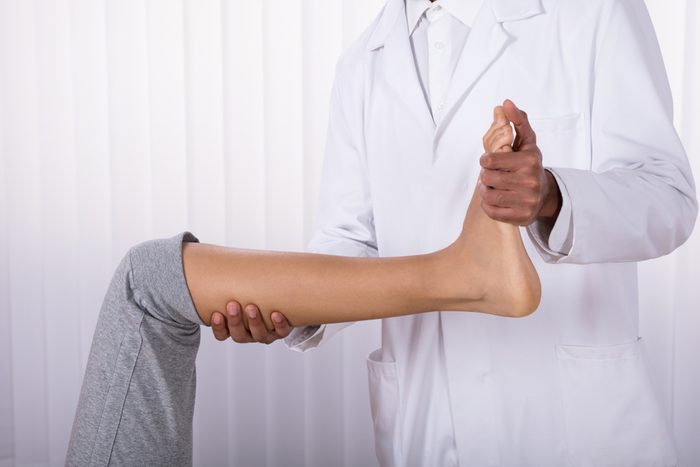
You ignore aches
Even if you’re not training for a marathon, stress fractures can happen from overuse. “Just because there’s no incident that caused trauma doesn’t mean there’s no injury,” Dr. Pruthi says. Ongoing pain when you’re walking will only worsen and could develop other injuries. “If something doesn’t feel right, make sure to get it checked out by a podiatrist,” Dr. Pruthi adds.
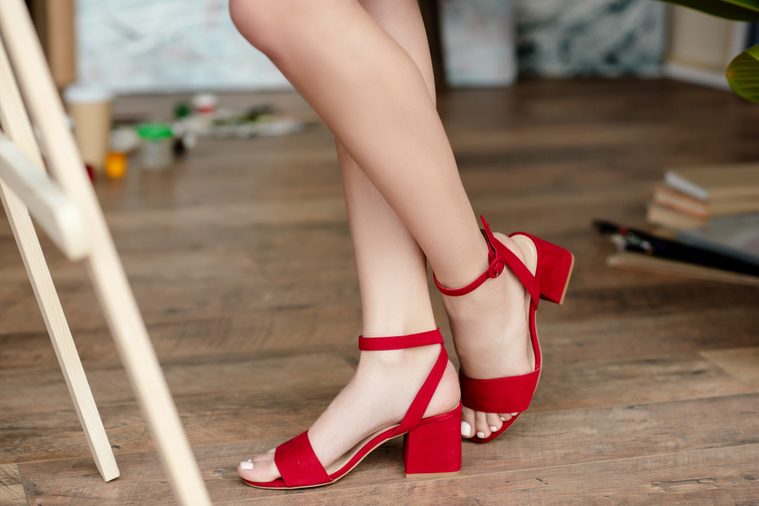
You wear your outdoor shoes inside
According to Dr. Cunha, it’s worth the extra time to slip shoes on and off before going into your house. “Shoes that you wear outside of the house are exposed to germs and viruses that are then tracked into your home. Wearing shoes indoors or storing them somewhere that you sit or lay can put you at risk for catching fungus or warts,” he says. Next, read about these 9 common foot problems and podiatrists’ solutions for them.
